Psychology Terminology Made Simple: A High School Student’s Guide

Every subject or industry has its own unique collection of subject-specific terms that aren’t used in everyday life. For many, this can be really intimidating when starting to study a subject, and it’s often one of the biggest barriers for beginners.
In this article, we’ll be breaking down some of the most commonly used terms in the psychology field to give you an introduction to its specialised terminology.
What Is Psychology Terminology?
Psychology terminology refers to specific words or phrases that are used within the field to describe and analyse various aspects of the human mind and behaviour. Understanding psychology terminology is essential for understanding psychological research and the mental processes which psychology focuses on.
For the opportunity to learn and practise psychology terminology with experts in the field, check out our online Psychology course!
Why Should High School Students Learn Psychology Terminology?
Developing a strong foundation in psychology terminology will give you a head start in preparing and pursuing a career in the field. Much of the existing psychological literature (even for beginners) makes use of psychology terminology, so taking the time to learn some of the basic terms and phrases will help make your exploration of the subject a lot more comprehensible.
I. Self-awareness and personal growth
Outside of the subject itself, understanding psychology terminology can also be helpful in exploring and comprehending your own thoughts, emotions and behaviours. This is an excellent way to foster self-awareness, enabling you to identify your own thought processes and emotions, which is vital in managing common struggles like stress and anxiety.
Understanding psychological concepts can also help empower you to make informed decisions for personal growth and wellbeing. For example, it can help you identify and understand maladaptive thinking styles or uncomfortable emotions.
II. Improved communication and relationships
A solid understanding of psychology terminology also provides a framework for understanding and empathising with others. A large part of psychology terminology provides different ways to discuss thought processes and emotions, enhancing your communication skills and self-expression.
A key aspect of psychology is interpersonal relationships, and the study of social behaviours and cognition. Learning about concepts within this, such as empathy, can lead to healthier and more meaningful connections with your peers, family and friends.
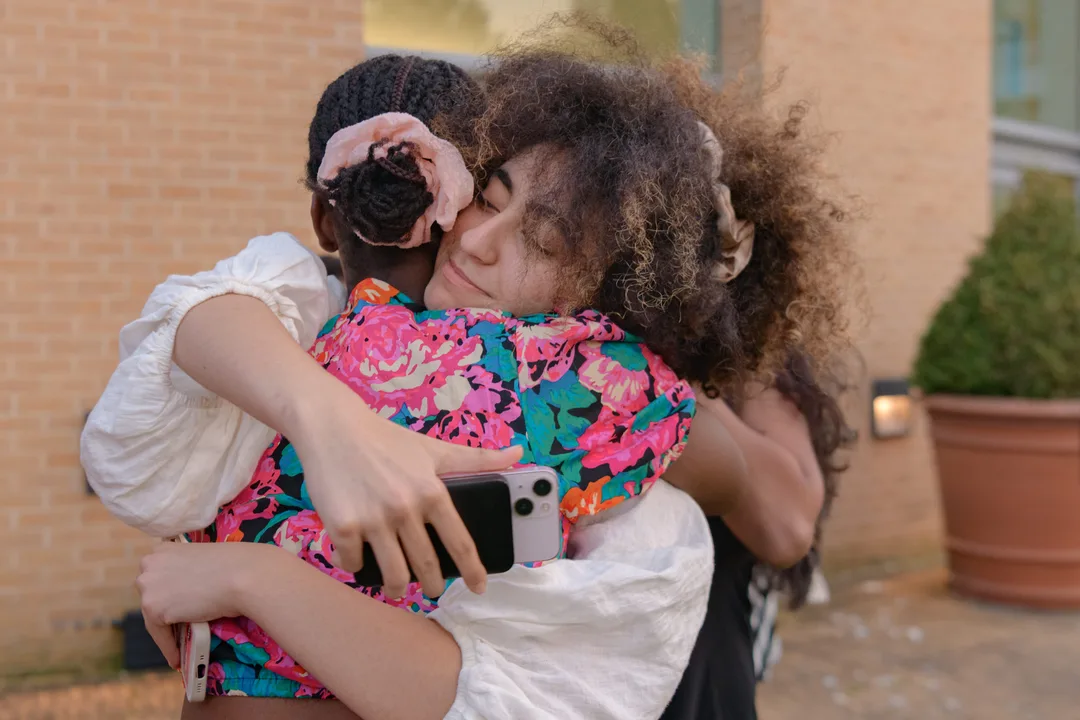
III. Academic and career advantages
If you’re looking to pursue a career in psychology, then an early start to learning the terminology is incredibly valuable. Not only does it provide a solid foundation for a Psychology degree, but it’s also beneficial in other professions such as marketing, education and healthcare. Even if you decide Psychology isn’t the subject for you, knowledge of psychology terminology will be helpful in any role where understanding human behaviour is key.
A Psychology degree opens up opportunities in a wide range of psychological (and allied) fields, such as counselling and social work.
If you’re looking to get involved in the psychological field, take a look at our online Psychology internships.
IV. Critical thinking and problem solving
Taking the time to learn psychology terminology also encourages the development of critical thinking and problem-solving skills – especially as some of the concepts you’ll come across are somewhat ambiguous and debated!
It also equips students with the tools to analyse complex situations, make informed decisions, and evaluate the validity of psychological research and claims. With psychology being such a relevant field of study for real-world situations, learning the terminology will also enhance your capacity to address real-world issues and challenges.
How Do I Learn Psychology Terminology?
Since psychology is such a broad field, it can encompass an incredibly wide range of terminology, which can be intimidating and difficult to learn. However, there are a number of strategies that can help make the terminology stick.
The psychology of learning and memory teaches us that repetition is a very important process in storing memories long-term. Therefore, regular practice and review of the terminology you have come across is helpful in retaining them. There are many approaches to practising, and you can change things up to keep it interesting.
You could use a combination of:
- Flashcards
- Quizzes
- Mnemonics
- Acronyms
- Group study
- Interactive apps and games
Give them a try!
Psychology Terminology for High School Students
Without further ado, let’s get into some key psychology terms!
Foundational terms
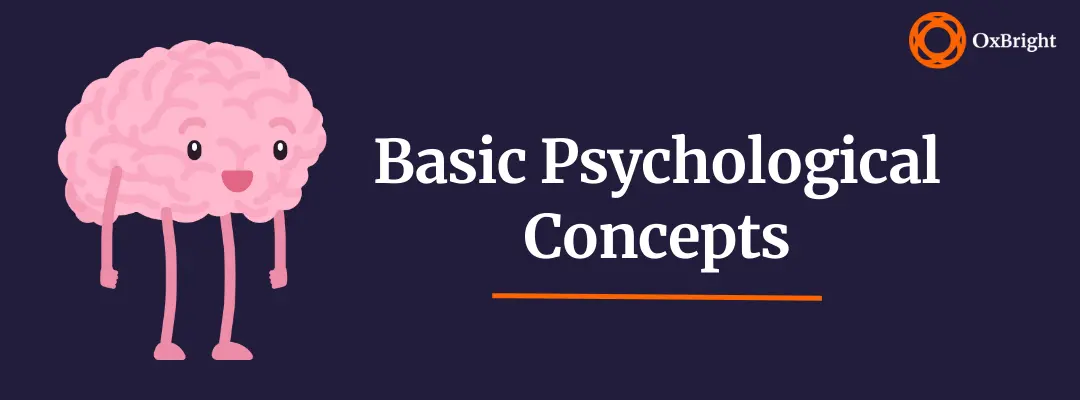
Basic Psychological Concepts
Consciousness refers to one’s awareness of both their internal and external environments, including their own thoughts and feelings, and the sensory stimuli in the outside world. While this seems relatively simple to understand, there’s been debate over the exact concepts of consciousness and how it developed. Although it’s an unlikely explanation (and cannot be scientifically tested), Jaynes’ theory of the bicameral mind is a really interesting perspective on the development of human consciousness.
Perception refers to the processing of information that has been picked up by our senses, and includes processes of recognition, observation, discrimination and more. Notably, perception can sometimes be confused with sensation (which refers just to the picking up of stimuli via our senses), so it’s important to note that perception includes extra processing of the information, which is necessary for us to interpret the stimuli meaningfully.
Cognition refers to all forms of processing that occur in order to understand the world, form memories, reason, come to decisions, solve problems and more.
Behaviourism refers to a branch of psychology which suggests that all behaviours are acquired through conditioning; that your experiences and interactions with the environment are the root of your thought processes. The beginnings of behaviourism are primarily traced back to Pavlov’s classic study of conditioning, where he taught the dog to salivate in response to a bell by pairing the bell and food together many times. Fun fact though, while the paradigm is commonly described as using a bell, Pavlov did not actually use a bell…
Personality is a combination of characteristics used to describe a person which are relatively enduring throughout one’s life. There are a few different theories of the different aspects of personality, but the most commonly used model is the OCEAN model (openness, conscientiousness, extroversion, agreeableness and neuroticism).
Motivation theory is a theory of motivation.
Attachment theory relates to the development of close emotional bonds with significant social others in one’s life, and describes this as a vital part of normative development.
Self-actualisation refers to a process by which someone reaches their full-potential.
Hierarchy of needs is a concept introduced by Maslow, which describes how one’s needs can be divided into different levels, with each prior level needing to be filled before the next one. For example, this starts with physiological needs, such as food and water, followed by safety needs. Self-actualisation sits at the top of the hierarchy.
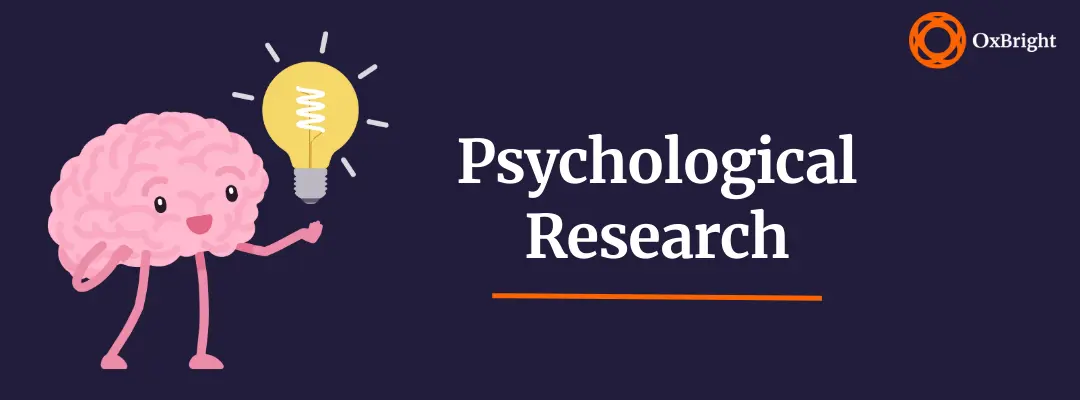
Psychological Research
Hypothesis is what you think you’ll find from your research before you start. The type of hypothesis you form also determines the type of statistical test you run, depending on whether you simply state to expect to find a difference between the conditions of the study, or whether you also include an expected direction of difference.
Experiments are conducted by researchers to explore a psychological construct in a controlled way, with manipulation of the concept of interest. Research is only considered an experiment when the researchers directly manipulate the conditions, otherwise it should be called a study.
Surveys are when researchers collect, measure and analyse data from participants. This is usually done via interviews with the participants, or by self-report questionnaires where participants tell the researcher their results.
Observational study is research which is conducted via passive observation of the behaviours of the participants, without any intervention or manipulation. This usually takes place in naturalistic contexts, which ensures that behaviours observed are reflective of behaviours in natural everyday contexts. However, it also naturally results in a lack of control, as researchers can’t interfere.
Control group is a cohort of individuals where the independent variable is not manipulated, or there’s an established manipulation for which we already know the effects. In essence, the control group is the group where no significant difference from normal is expected. These are especially important for studies testing interventions, and many different types of control groups (with varying values and varying difficulties) can be used.
Experimental group is the group of participants who experience the manipulation which is expected to alter or affect the examined construct. In most cases, a significant finding is reflected in a significant difference in the results of the control group and the experimental group.
Bias refers to a tendency of an individual or of a sample to favour one result over another. There are many different types of biases, such as response bias (a tendency for participants to respond in a particular way) and researcher bias, wherein the expectations of the researcher alters the findings in some way. This can come into play during every stage of the study, including the design, the recruitment of participants, the analysis, and even the reporting of findings.
Correlation is the degree to which two variables are linearly associated with each other. Importantly, you might hear the phrase “correlation does not equal causation” relatively frequently. This is a commonly identified limitation of correlational data, as we cannot determine the underlying cause of the correlation – we don’t know whether it is changes in one variable that lead to changes in the other variable, or the other way around, or even if it’s explained by another (unmeasured) variable.
Placebo effect is a phenomenon wherein a clinically significant effect (for example, relief in symptoms or remission from diagnosis) is seen in response to an inactive substance or a nonspecific treatment. This is especially important in trials which test the effectiveness of new treatments.
Case study is an in-depth investigation of a single individual, family or event, often involving the collection of a range of different types of data, including psychological, physiological, biographical, environmental and more. These are often used for neuropsychological cases, such as when someone has experienced brain damage. Conducting a case study on such patients allows us to explore the effects of a particular type of brain damage, while alludes to the role of an area of the brain, without experimentally causing that damage.
Specialised terms
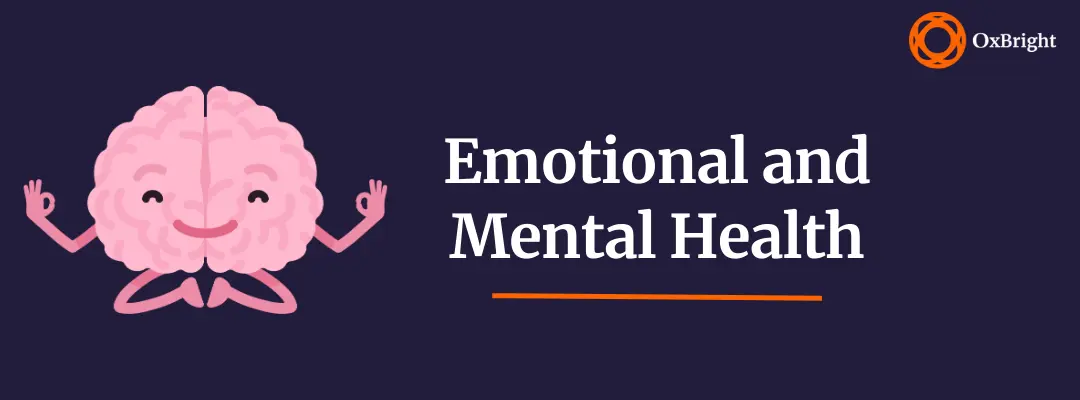
Emotional and Mental Health
Emotional intelligence is a subset of intelligence which refers to one’s ability to process emotional information, and to use it in reasoning. This includes the ability to accurately perceive emotions and to understand emotional language, as well as to regulate one’s own and other people’s emotions. However, the presence of this as a factor that’s separable from intelligence in general is relatively disputed.
Stress is a normal physiological and psychological response to a stressor (usually a negative, anxiety-inducing cue either in the external environment, or within one’s internal environment). Stress can manifest physiologically (fidgeting, accelerated speech etc.) but also psychologically, often introducing negative biases to thinking processes. While stress is a normal response in some cases, excessive stress can have long-lasting impacts on an individual.
Anxiety is a physiological and psychological response to a perceived threat, often involving a physiological preparation to flee or to fight. When it comes to the exploration of anxiety in emotional and mental health, there’s some ambiguity when the word is used alone. Psychologists often distinguish between trait anxiety, which refers to one’s tendency towards experiencing anxiety, and state anxiety, which refers to the feelings of anxiety in a particular time. Notably, when an experience of anxiety is repeated and significantly negatively impacts one’s life, then it might be considered an anxiety disorder.
Depression is a negative emotional state that interferes with daily life. It’s usually associated with large changes (increase or decrease) in sleep and/or eating, lack of motivation and energy, difficulty concentrating and more. As with many mental health difficulties, the line between depression being considered a normal response and it being considered a disorder is the extent to which it prevents the individual from living their regular life.
Self-esteem refers to how positive one’s perception of themself is, particularly in terms of their accomplishments and capabilities.
Mood disorders are a mental health condition that is primarily characterised by long periods of intense emotional states, and includes both positive and negative emotions.
Coping strategies are actions or thoughts utilised in a stressful or unpleasant situation, with the goal of reducing or modifying one’s reaction to the situation. These are a common feature of therapies, with therapists often teaching clients different coping strategies to deal with negative emotions in everyday life.
Mindfulness is an intervention or strategy that can be used to increase awareness of one’s internal states and surroundings, with the goal of reducing one’s stress in a situation and avoiding automatic destructive responses that many people with a mental health difficulty might default to in a stressful environment.
Psychosomatic relates to the interaction between the mind and the body. Psychosomatic disorder refers to a condition where someone experiences physical symptoms, which seem to be caused by psychological reasons, rather than a physical medical cause.
Trauma is any disturbing experience that leads to significant fear, helplessness, dissociation and other intense disruptive feelings in other situations, which may resemble the initial experience in some way. Individuals might also experience flashbacks following a traumatic experience. However, these are all normal responses to a traumatic event, and would not be considered a disorder (PTSD) unless they persist beyond a certain amount of time after the event. One prominent cognitive theory of PTSD suggests that it is the result of the memory of the event not being sufficiently integrated into the catalogue of memories, and is therefore triggered whenever a similar stimulus is experienced.
Psychotherapy is a psychological service that uses communication and interaction to assess, diagnose and treat any mental health difficulties.
Stigma is a commonly held untrue attitude towards an individual, usually based on perceived mental, physical or social deficiencies. Negative stigmas are often experienced by people with mental health difficulties, and can be an immense barrier to seeking treatment.
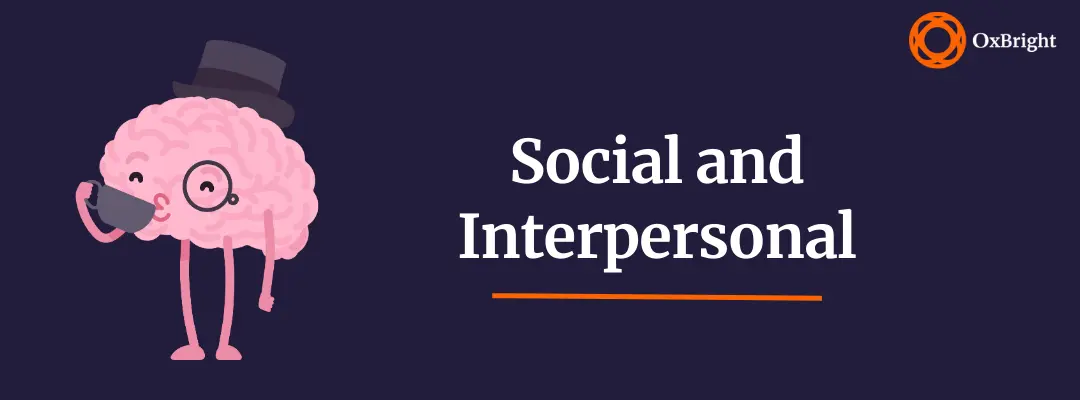
Social and Interpersonal
Empathy is the ability to understand a person from their point of view, which can involve vicariously experiencing the other person’s thoughts and feelings. Studies have indicated that empathy is significantly greater when one relates to an individual, and greater empathy can also be a driver to increased helping behaviours.
Communication is the transmission of information, which can be through verbal or nonverbal processes. Communication is a vital aspect of human life as it underlies all social and interpersonal interactions. Interestingly, the exploration of communication in different species has led to suggestions of what makes a human “an intelligent species” compared to other animals. Some have suggested that humans’ abilities to communicate about future possibilities and past events (which many animals don’t seemingly do) plays a key part in this, as it indicates the ability to have cognitions about the future and the past.
Assertiveness is an adaptive style of communication where individuals directly express their thoughts, feelings and needs, in a respectful way.
Stereotype is a set of beliefs about a group of people, or a social category, so that the traits held within the stereotype are generalised to every individual of that social group. They can be both positive or negative, though there is a greater tendency for them to be negative.
Peer pressure is a process by which individuals’ behaviours and thoughts are influenced by those of other individuals within their peer group (e.g. people of the same age, from the same school etc.). The general increase in peer pressure, and in giving into peer pressure during adolescence, has been associated with the increase in mental health conditions seen in adolescence (particularly in anxiety and depression).
Conflict resolution is the reduction of friction between individuals or groups. There are a few different theories on effective strategies for conflict resolution, with some suggesting that working together towards a shared goal is the most effective method, while some suggest that simply increasing contact between individuals or groups will lead to resolution of conflict.
Prejudice is a negative attitude held toward another person or group before having personally engaged with that person or group. This includes an emotional component, a cognitive component (which relates to stereotypes held about the group), and a behavioural component if it results in negative behaviours like discrimination and violence.
Norms are a standard behaviour or thought process considered to be typical for a particular group. Social norms underlie many interpersonal behaviours, as many individuals will conform (act in line with) the social norms of their group to feel like they belong to the group as much as possible.
Social identity is a part of one’s self-concept that is the result of the social groups they are a member of. An individual has many different social identities, depending on context. For example, one might have a social identity that relates to the school they go to, and also one that relates to the people they do extra-curricular activities with. Striving to consolidate one’s position within a social group has been suggested to underlie violence between groups.
Group dynamics are the processes that occur within social groups, which affect how people are affiliated with each other, how they communicate, make decisions and more. It also includes the patterns of leadership within the group, and can be used to explain conflict within a social group.
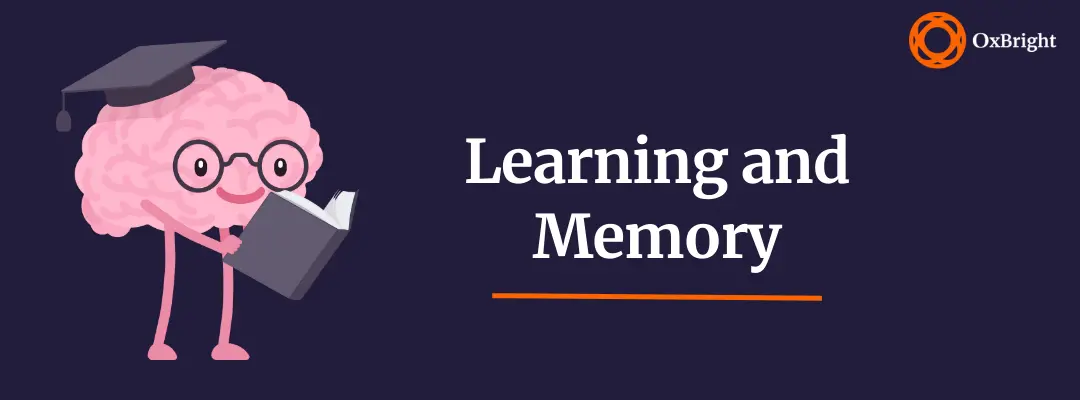
Learning and Memory
Classical conditioning is a type of learning where repeated pairings of a neutral stimulus (the conditioned stimulus) with a stimulus that elicits a response (the unconditioned stimulus) leads to the generation of the response when the neutral stimulus is presented. The classic example of this is Pavlov’s dog who salivated in response to a bell.
Operant conditioning is also known as instrumental learning. This refers to a type of learning (in this case, an acquisition of an association) wherein response is required to achieve the outcome. An example would be if a mouse learnt to pull a lever to get food every time a light appears.
Cognitive dissonance is the psychological state that occurs when one holds two or more contradicting thoughts about a single subject, resulting in a motivational drive to reduce the dissonance. For example, if one holds the belief that smoking is bad for you, but also smokes, they might reduce the dissonance between these cognitive elements by convincing themselves that smoking isn’t that bad for you, or by stopping smoking. The striving to reduce cognitive dissonance can be a cause of behaviour change.
Divergent thinking is a way of thinking that differs from the strategies that would commonly be used to reach a decision or solve a problem.
Retrieval is the process where a stored memory is recovered, often from the long-term memory. Whenever you are recalling something that has happened, or something you have read (such as the start of this article…), you’re utilising the memory process of retrieval.
Schemas are a cognitive structure that holds one’s knowledge about an entity or situation, including the qualities and the relationships it has with other entities.
Encoding is the process by which sensory information is converted into a form which can be processed and saved in memory.
Repression is a protective mechanism wherein painful or unwanted thoughts and emotions are prevented from coming into consciousness, though they can continue to cause negative effects in unconscious domains.
Positive reinforcement occurs when a positive consequence (i.e. a reward) is given in response to an action, which in turn increases the probability that one will engage in that action, in order to receive further reward.
Negative reinforcement is when a negative consequence (i.e. a punishment) is given in response to an action, thus decreasing the likelihood that one will do that action again, to avoid further punishment.
While it can be intimidating, starting off with basic terms that apply to all branches of psychology can help you get a general idea of the field, and better understand any further exploration you do.
Once you have an idea of the area within psychology which interests you most, exploring some of the more specialised terms can help you to develop your interest. Don’t feel pressured to learn them all at once though! You’ll inevitably encounter most of them many times, and in different contexts, all of which will help you to develop a well-rounded understanding of the term and the psychological construct it describes.
With consistent learning, and use of psychology terms (even in your everyday life), it can be relatively easy to build up a formidable foundation and understanding of psychology.

By Kylie Li
Kylie is reading Experimental Psychology student at Queen’s College, Oxford. She is most interested in developmental and cognitive psychology, and how these can be applied to the education system.
Recommended articles
OxBright Tutors Share Their Top Tips for High School Graduates
Finishing high school can be a really intimidating juncture – you’re leaving the security of a routine you’ve followed for five plus years, and you’re faced with more options and less structure than ever before. Oh, and your decisions now can shape your future in a...
Which Career Is the Best Fit for Me?
Choosing your career path is one of the first big steps you’ll take as a young adult, so it can often be a daunting prospect. However, the possibilities are endless, and as long as you base your choices on your personal preferences, passions and interests, your...
How to Make a Study Schedule That Actually Works
Studying can sometimes feel like a daunting task, no matter how old you are or what level you’re studying at. You might be left thinking: How can I balance academics with my other commitments? How do I stay consistent with a study schedule? Is there a “good” or...



